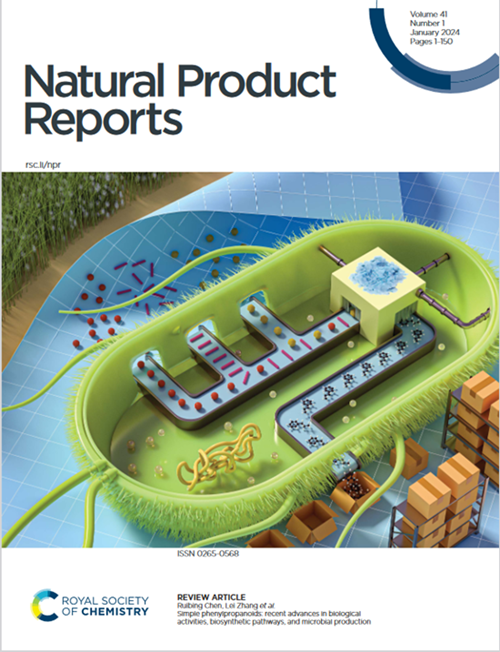Human microbiota peptides: important roles in human health
IF 10.6
1区 化学
Q1 BIOCHEMISTRY & MOLECULAR BIOLOGY
引用次数: 0
Abstract
Covering: 1974 to 2024
Human microbiota consist of a diverse array of microorganisms, such as bacteria, Eukarya, archaea, and viruses, which populate various parts of the human body and live in a cooperatively beneficial relationship with the host. They play a crucial role in supporting the functional balance of the microbiome. The coevolutionary progression has led to the development of specialized metabolites that have the potential to substitute traditional antibiotics in combating global health challenges. Although there has been a lot of research on the human microbiota, there is a considerable lack of understanding regarding the wide range of peptides that these microbial populations produce. Particularly noteworthy are the antibiotics that are uniquely produced by the human microbiome, especially by bacteria, to protect against invasive infections. This review seeks to fill this knowledge gap by providing a thorough understanding of various peptides, along with their in-depth biological importance in terms of human disorders. Advancements in genomics and the understanding of molecular mechanisms that control the interactions between microbiota and hosts have made it easier to find peptides that come from the human microbiome. We hope that this review will serve as a basis for developing new therapeutic approaches and personalized healthcare strategies. Additionally, it emphasizes the significance of these microbiota in the field of natural product discovery and development.

人类微生物群肽:在人类健康中的重要作用。
覆盖范围人类微生物群由多种微生物组成,如细菌、真核生物、古细菌和病毒,它们分布在人体的各个部位,与宿主生活在一种合作互利的关系中。它们在支持微生物组的功能平衡方面发挥着至关重要的作用。这种共同进化过程导致了特殊代谢物的发展,这些代谢物有可能替代传统抗生素,应对全球健康挑战。尽管对人类微生物群进行了大量研究,但人们对这些微生物群产生的各种肽还缺乏了解。尤其值得注意的是,人类微生物群,特别是细菌,会产生独特的抗生素来抵御入侵性感染。本综述旨在通过全面了解各种肽及其对人类疾病的深入生物学重要性来填补这一知识空白。基因组学的进步以及对控制微生物群与宿主之间相互作用的分子机制的了解,使得寻找来自人类微生物群的多肽变得更加容易。我们希望这篇综述能成为开发新的治疗方法和个性化医疗策略的基础。此外,它还强调了这些微生物群在天然产品发现和开发领域的重要意义。
本文章由计算机程序翻译,如有差异,请以英文原文为准。
求助全文
约1分钟内获得全文
求助全文
来源期刊

Natural Product Reports
化学-生化与分子生物学
CiteScore
21.20
自引率
3.40%
发文量
127
审稿时长
1.7 months
期刊介绍:
Natural Product Reports (NPR) serves as a pivotal critical review journal propelling advancements in all facets of natural products research, encompassing isolation, structural and stereochemical determination, biosynthesis, biological activity, and synthesis.
With a broad scope, NPR extends its influence into the wider bioinorganic, bioorganic, and chemical biology communities. Covering areas such as enzymology, nucleic acids, genetics, chemical ecology, carbohydrates, primary and secondary metabolism, and analytical techniques, the journal provides insightful articles focusing on key developments shaping the field, rather than offering exhaustive overviews of all results.
NPR encourages authors to infuse their perspectives on developments, trends, and future directions, fostering a dynamic exchange of ideas within the natural products research community.
 求助内容:
求助内容: 应助结果提醒方式:
应助结果提醒方式:


